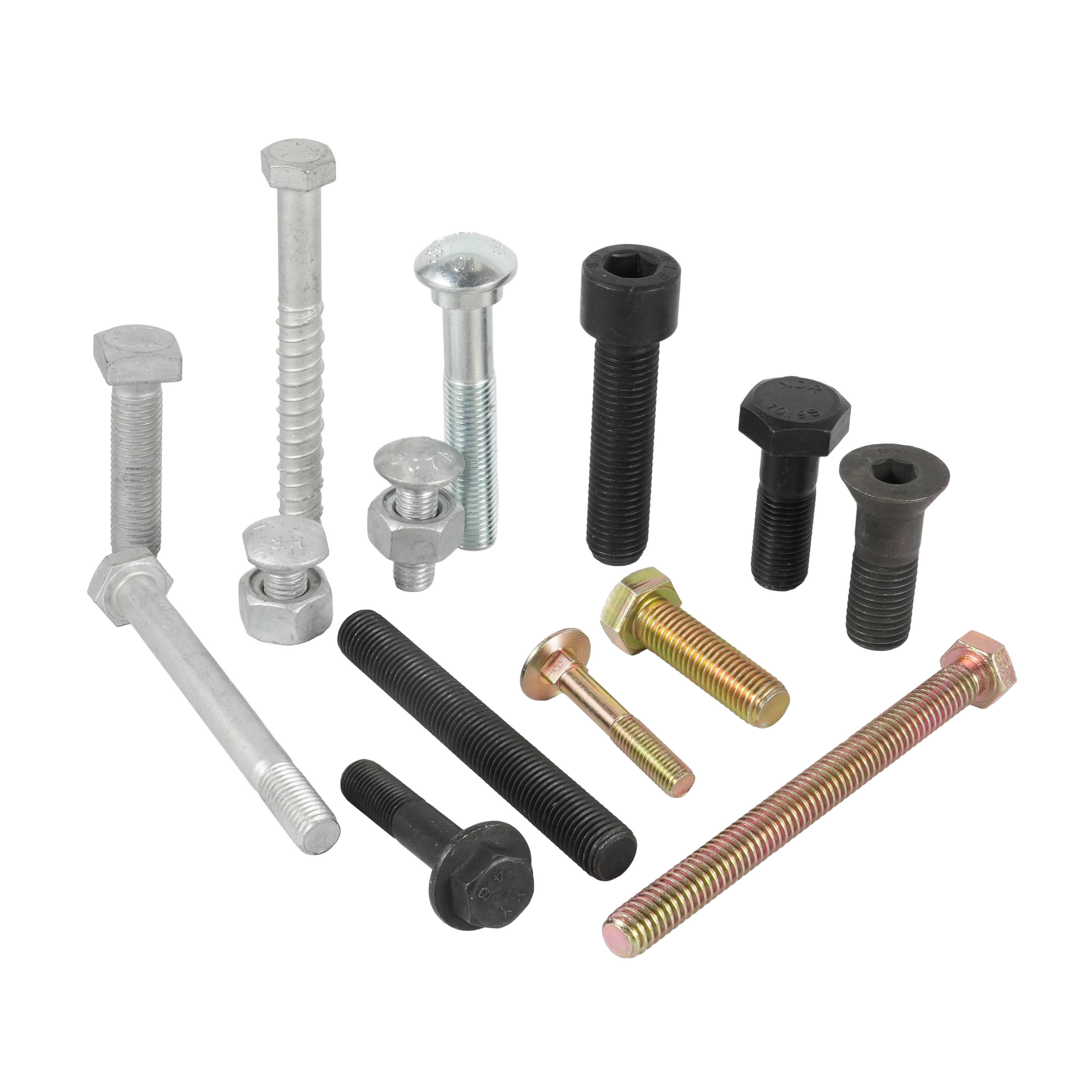Razumijevanje ključne uloge preciznih spojnica u modernom inženjerstvu
U svijetu inženjerstva i građevinarstva, važnost pojedinačno izrađenih vijaka ne može se dovoljno naglasiti. Ove precizno izrađene spojnice služe kao doslovnih gradivni blokovi koji drže naša najkritičnija strukturna rješenja i strojeve spojenima. Od primjena u zrakoplovnoj industriji do teške industrijske opreme, pojedinačni vijci imaju ključnu ulogu u osiguravanju strukturne cjelovitosti, sigurnosti i optimalnih performansi.
Kada standardna rješenja nisu dovoljna, prilagođeni vijci postaju neophodni za projekte koji zahtijevaju specifične zahtjeve u pogledu veličine, sastava materijala, čvrstoće i specijaliziranih značajki. Donošenje informirane odluke o ovim ključnim komponentama zahtijeva duboko razumijevanje različitih čimbenika koji utječu na njihovu izvedbu i trajnost.
Osnovni čimbenici u prilagođenim Bolt Odabir
Svojstva materijala i okolišni aspekti
Izbor materijala za prilagođene vijke znatno utječe na njihovu izvedbu i izdržljivost. Inox čelici nude odličnu otpornost na koroziju i idealni su za morske uvjete ili primjene izložene agresivnim kemikalijama. Vijci od ugljičnog čelika osiguravaju izvrsnu čvrstoću i često se koriste u konstrukcijskim primjenama gdje je nosivost od presudne važnosti.
Faktori okoline, poput promjena temperature, izloženosti UV zračenju i prisutnosti kemikalija, moraju se pažljivo procijeniti. Na primjer, aeropropskim aplikacijama mogu biti potrebni posebni vijci od titanijevih legura kako bi izdržali ekstremne promjene temperature i osigurali optimalni omjer čvrstoće i težine.
Zahtjevi opterećenja i analiza naprezanja
Razumijevanje točnih zahtjeva opterećenja ključno je pri odabiru posebnih vijaka. To uključuje statička i dinamička opterećenja, kao i moguće udarne opterećenja ili vibracije. Inženjeri moraju uzeti u obzir faktore poput vlačne čvrstoće, posmične čvrstoće i otpornosti na zamor pri definiranju parametara vijaka.
Može biti potrebna napredna računalna analiza kako bi se utvrdile točne specifikacije potrebne za posebne vijke u kritičnim aplikacijama. To može uključivati metodu konačnih elemenata (FEA) za simulaciju raspodjele naprezanja i identifikaciju potencijalnih točaka sloma pod različitim uvjetima opterećenja.
Specifikacije dizajna i aspekti proizvodnje
Zahtjevi za dizajnom i tolerancijom navoja
Specifikacije navoja za posebne vijke moraju biti točno definirane na temelju zahtjeva primjene. To uključuje korak navoja, profil i klasu dosjeda. Vijci s finim navojem obično pružaju bolju silu stezanja i otpornost na labavljenje uslijed vibracija, dok se grublji navoji mogu preferirati radi lakšeg montiranja u određenim primjenama.
Zahtjevi za tolerancijama zaslužuju posebnu pozornost, jer izravno utječu na funkcionalnost vijka i njegovu zamjenjivost. Uslužne tolerancije mogu biti potrebne za precizne strojeve, dok šire tolerancije mogu biti prihvatljive za opće građevinske primjene.
Obrada površine i opcije obloge
Površinska tretiranja i premazi poboljšavaju radna svojstva posebnih vijaka. Cinkovanje osigurava osnovnu zaštitu od korozije, dok naprednija tretiranja poput nitrokarburizacije mogu poboljšati otpornost na habanje i tvrdoću površine. Odabir odgovarajućeg površinskog tretiranja mora uzeti u obzir čimbenike kao što su ekonomičnost, zahtjevi za trajnošću i kompatibilnost s pripadajućim materijalima.
Specijalizirani premazi također mogu imati određene funkcije, poput suhih podmazivanja za smanjenje trenja tijekom montaže ili termički otpornih premaza za primjenu na visokim temperaturama. Ova tretiranja moraju se pažljivo odabrati kako ne bi narušila mehanička svojstva vijka.
U skladu s člankom 4. stavkom 2.
Zahtjevi za mehaničkim ispitivanjem
Strogi postupci testiranja osiguravaju da prilagođeni vijci zadovoljavaju navedene kriterije performansi. To obično uključuje ispitivanje zatezne čvrstoće, ispitivanje tvrdoće i ispitivanje dokaznog opterećenja. Za kritične primjene, dodatna ispitivanja poput ispitivanja udarnosti ili zamora materijala mogu biti potrebna kako bi se potvrdile performanse vijka u specifičnim uvjetima.
Dokumentacija rezultata testiranja i certifikata o materijalu osigurava ključnu praćivost i jamstvo kvalitete. Ovo postaje posebno važno u reguliranim industrijama gdje mora biti dokazano sukladnost s određenim standardima.
Standardi inspekcije i certificiranja
Mjere kontrole kvalitete za prilagođene vijke trebale bi uključivati i kontrolu dimenzija i provjeru materijala. Savremene tehnike inspekcije, kao što su optički mjerni sustavi i spektrografska analiza, osiguravaju sukladnost s tehničkim specifikacijama. Redovno testiranje serija i statistička kontrola procesa pomažu u održavanju dosljednog kvalitete tijekom serije proizvodnje.
Zahtjevi za certificiranje variraju ovisno o industriji i primjeni, ali mogu uključivati posebne standarde kao što su ISO 9001, AS9100 za zrakoplovne primjene ili certifikata specifična za industriju. U skladu s člankom 21. stavkom 1.
Optimizacija troškova i upravljanje lancem opskrbe
Razmatranja o obimu proizvodnje
U skladu s člankom 3. stavkom 2. točkom (a) ovog članka, za proizvodnju šrafta za proizvodnju šrafta za proizvodnju šrafta za proizvodnju šrafta za proizvodnju šrafta za proizvodnju šrafta za proizvodnju šrafta za proizvodnju šrafta za proizvodnju šrafta za proizvodnju šrafta za U skladu s člankom 3. stavkom 1. točkom (a) Uredbe (EU) br. 1303/2013 Komisija je odlučila da se u skladu s člankom 3. stavkom 1. točkom (a) Uredbe (EU) br. 1303/2013 odredi proizvodnja proizvoda koji se proizvode u skladu s člankom 3. stavkom 1. točkom (a) Uredbe (EU)
Proces proizvodnje treba odabrati na temelju tehničkih zahtjeva i gospodarskih čimbenika. U skladu s člankom 3. stavkom 1. točkom (a) Uredbe (EZ) br.
Izvršavanje zahtjeva
Učinkovito planiranje nabave posebno izrađenih vijaka zahtijeva pažljivo razmatranje rokova isporuke i strategija upravljanja zalihama. Bliskim surađivanjem s proizvođačima u uspostavi realističnih proizvodnih rasporeda i održavanjem odgovarajućih razina sigurnosnih zaliha, mogu se spriječiti skupi zastoji u proizvodnji.
Razvoj alternativnih strategija nabave i kvalifikacija više dobavljača može pomoći u ublažavanju rizika u lancu opskrbe te osigurati stalnu dostupnost ključnih komponenti.
Često postavljana pitanja
Koje informacije su potrebne prilikom naručivanja posebno izrađenih vijaka?
Prilikom naručivanja posebno izrađenih vijaka, potrebno je dostaviti detaljne specifikacije uključujući dimenzije, zahtjeve za materijal, klasu čvrstoće, specifikacije navoja, zahtjeve za površinskom obradom i standarde kvalitete. Također je važno specificirati radni okoliš, uvjete opterećenja i sve posebne zahtjeve poput certifikata ili postupaka testiranja.
Koliko obično traje proizvodnja posebno izrađenih vijaka?
Rokovi isporuke za posebno izrađene vijke mogu značajno varirati ovisno o čimbenicima poput složenosti, količine, dostupnosti materijala i proizvodnog procesa. Jednostavni posebni vijci mogu se proizvesti u roku od 2-4 tjedna, dok složenije specifikacije ili veće količine mogu zahtijevati 8-12 tjedana ili više. Važno je raspraviti zahtjeve za rokom isporuke na samom početku planiranja.
Je li cijena posebno izrađenih vijaka uvijek veća od cijene standardnih vijaka?
Iako posebno izrađeni vijci obično koštaju više od standardnih zbog specijaliziranih proizvodnih procesa i manjih serija proizvodnje, često nude bolju vrijednost dugoročno. Posebno izrađeni vijci mogu pružiti poboljšane performanse, dulji vijek trajanja i smanjene troškove održavanja ako su pravilno definirani za određenu primjenu. Treba uzeti u obzir ukupne troškove vlasništva, a ne samo početnu nabavnu cijenu.

